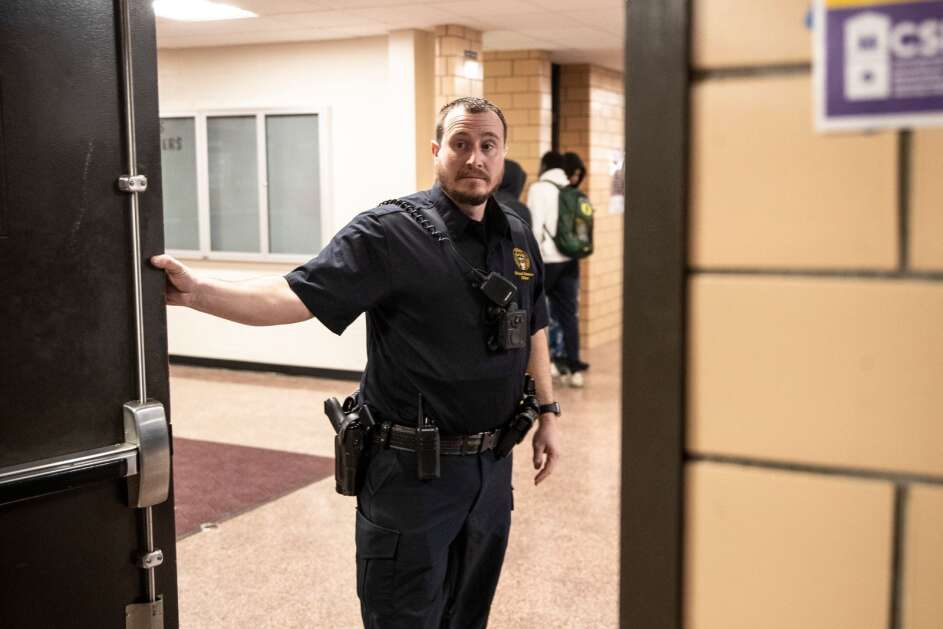The Gazette uses Instaread to provide audio versions of its articles. Some words might not be spoken correctly.
In an attempt to combat what the administration claims is vagrancy endangering American city streets, President Donald Trump has instructed federal agencies to look for methods to make it simpler to forcefully hospitalize homeless individuals with mental illness and addiction for extended periods of time.
Federal agencies are being urged by an executive order announced Thursday to reverse federal and state law precedents that restrict the ability of local and state governments to involuntary commit individuals who are dangerous to themselves or others.
According to the ruling, public order will be restored by placing homeless people in long-term institutional settings. Trump’s order stated that it is inhumane to the homeless and other residents to leave our towns and citizens in chaos and terror.
States enact legislation and manage the process of involuntary commitments, thus the effects of Trump’s executive order are still unknown. Such a strategy, according to critics, does nothing to assist people in affording accommodation and risks bringing the country back to a more sinister time when people were frequently wrongfully imprisoned in mental health facilities.
According to a statement from Jesse Rabinowitz, director of communications for the National Homelessness Law Center, the safest communities are those with the most homes and supports, not those that criminalize poverty or illness. He referred to forced treatment as ineffectual and unethical.
Critics claim that states with limited resources won’t have the room to hold additional people. However, according to the executive order, government resources could guarantee that inmates with severe mental illnesses are not released into society due to a shortage of beds in hospitals or prisons.
Additionally, the directive directs agencies to refrain from funding harm reduction initiatives that the administration claims encourage illegal drug use and to give priority to funds for drug courts and mental health services. Additionally, it demanded that assistance be given to states and towns that, to the greatest extent possible, enforce laws against open-air drug use and against urban camping, loitering, and squatting.
The executive order came as the Trump administration is planning to eliminate hundreds of millions more in agency awards and has already canceled over $1 billion in COVID-era grants that the Substance Abuse and Mental Health Services Administration administers.
Regina LaBelle, the director of the Addiction and Public Policy Initiative at the Georgetown University Law Center and a former drug policy official in the Biden White House, stated that there is no doubt that more needs to be done to address homelessness as well as untreated substance use disorder and mental health conditions in the United States. However, issuing an executive order won’t solve the country’s core problems while cutting off money for treatment and other initiatives that will assist prevent homelessness and untreated medical concerns.
Order has significant implications for Iowa homeless services
Alicia Faust, executive director of Willis Dady Homeless Services in Cedar Rapids, stated that the homeless services in Linn County will be significantly impacted by the President’s executive order.
Trump’s directive, according to Faust, also perpetuates negative preconceptions about those who are homeless and redirects funds from evidence-based solutions to a harsher approach.
According to Faust, only a small portion of homeless people suffer from mental health or drug use difficulties.
Critics contend that there is insufficient evidence to establish a direct correlation between homelessness and elevated crime rates, and that policy ought to prioritize shelter and resources over punishment and prosecution. According to some study, those without a home may be detained more frequently, although usually for non-violent crimes, and they are also more likely to have experienced violence themselves.
Faust claimed that because of the administration’s position on the housing first concept, the nonprofit organization has been getting ready for these changes. The established, research-based strategy places a high priority on giving homeless people instant access to long-term housing without asking them to first fulfill prerequisites like sobriety or treatment program participation. It highlights that access to stable housing is a basic necessity and an essential first step in resolving other problems people may have, such substance misuse, mental health disorders, or unemployment.
As a way to address homelessness, cities like Cedar Rapids and Iowa City are increasingly employing supportive homes rather than shelters. To improve general well-being and housing stability, the type of housing provides volunteer supportive services like mental health and substance use therapy as well as job training.
Numerous national studies have confirmed that the technique is more economical than letting homeless persons remain in shelters, prisons, or hospitals.
According to Faust, Trump’s order may impact almost half a million dollars in federal financing for Willis Dady’s HUD-supported programs, which include Housing First initiatives like permanent supportive housing and quick rehousing.
According to Faust, “the housing first model is really what we’re working towards because we believe that everyone deserves a safe and affordable place to call home.” By making investments in long-term supportive housing initiatives, such as buying and remodeling houses and growing our Chandler Pump Supportive Housing Complex, we have seen results. For those who have experienced long-term homelessness, this strategy offers low-barrier housing in addition to individualized case management services to meet their requirements.
According to recent data, over 90% of participants have kept their leases for the previous 12 months, demonstrating the program’s and Linn County’s Housing First model’s efficacy, she noted.
Despite the order and persistent stereotypes about those who are homeless, Faust stated that Willis Dady and its community partners will continue to assist those who are homeless or experiencing housing problems, including maybe looking for alternate financing sources.
We will continue to offer those services for as long as we possible can because we believe in the services we are offering and in the best practices that have been studied and supported by evidence, she said.
Christine Hayes is the director of communications and development for Shelter House, a permanent supportive housing organization located in Iowa City.
According to Hayes, the decision disregards decades of research, takes tried-and-true methods of ending homelessness out of the toolbox of towns and service providers, and runs the risk of cutting off funds for continuing supporting programs that keep 60 individuals in housing in Johnson County.
“There is nothing in the order that has been shown to end homelessness,” she said. In actuality, it has the opposite effect. The one thing that has been shown to end homelessness is making sure that there is a sufficient supply of safe, affordable housing with wraparound services that people can access to stay housed. There is no proof that criminalization has ever reduced the number of people sleeping outside.
According to Hayes, people change for the better when they have the freedom to choose, and the housing first strategy meets people where they are and lets them handle problems in accordance with their own priorities.
Additionally, studies have demonstrated that housing someone with supportive services is far less expensive than locking them up. According to the National Alliance to End Homelessness, state and local governments in Iowa spent 1.2 times as much on incarceration in 2022 as they did on housing and community development.
Given the current situation of mental health services in Iowa, Hayes also rejected the idea that more institutionalized choices will inevitably become accessible. According to the Treatment Advocacy Center, Iowa has two state psychiatric beds per 100,000 people, which places it worst in the country.
She underlined the necessity for local solutions catered to particular community requirements and stated that individuals are already moving from hospitals to emergency shelters since there aren’t enough beds for mental health patients.
There is no one-size-fits-all approach to helping those who are sleeping outside and in need of our care and support; Hayes stated that we shouldn’t be pressured to choose a less-than-ideal alternative.
States have expanded involuntary commitment laws
As the country struggles with a growing housing problem, Trump and Republican leaders have found that homelessness and views of street violence gone wild are powerful issues.
Last year, the Supreme Court dismissed a constitutional appeal to a set of anti-camping regulations, ruling that towns can prohibit homeless people from sleeping outside.
Suggested Reading
Iowa lawmakers could revisit homelessness legislation after Supreme Court ruling
About three months after the Justice Department’s vigorous push to remove homeless individuals from public settings, which included asking agency officials in charge of grant disbursements to come up with ideas for clearing encampments and increasing forced hospitalizations, Trump issued the executive order.
Over the past ten years, involuntary commitment laws have been expanded or added to in dozens of states. As an example of how political momentum has turned toward a more forceful approach to addressing the intricately linked crises of addiction and mental health, this includes states that are under Democratic administration.
Following years of intense discussion and unsuccessful attempts, state legislators in Oregon are moving forward with a bill that would make it simpler to compel someone who poses a risk to themselves or others to seek treatment.
This year, a statute was implemented in California that broadened the definition of involuntary commitment eligibility to include those with substance use disorders.
This year, state legislators in New York strengthened previous state guidelines that permitted first responders to involuntary commit individuals with severe mental illnesses who are unable to provide for their own basic necessities, such as food, shelter, or medical attention.
According to Patrick Wildes, a former Hochul assistant secretary for human services and mental hygiene, there may be an increase in police officers taking people to the hospital, but it is unlikely that many more people would be hospitalized for forced treatment.
He stated, “I don’t believe that there are a lot of people waiting around who appear ill and need to be picked up.” However, I do believe that some members of the public may feel more at ease knowing that, in theory, it is simpler for the government and authorities to try to bring them in.
The issue of forced hospitalizations has long plagued the country.
In 1975, the Supreme Court in a landmark ruling cemented due process rights for people with mental illness, ruling that they could not be involuntarily committed without showing that they posed a danger. A higher legal standard for committing someone to therapy against their will was established by the court four years later.
Trump asserted during the campaign that drug addicts and potentially insane people had taken over American towns. He suggested placing individuals in government-sponsored tent communities and pledged to place them in mental hospitals where they belong.
According to Jennifer Mathis, deputy director of the Judge David L. Bazelon Center for Mental Health Law, his rhetoric points to a desire for layoffs and a return to institutionalization.
At a time when the federal government is making historic cuts to Medicaid services and housing, no state can afford to warehouse people with disabilities in costly institutions, Mathis said. Locking up more people is not a solution.
But the federal government has virtually no power to force states to change how they handle involuntary commitments, said Keith Humphreys, a former White House drug policy adviser who is now a Stanford University psychiatrist specializing in addiction. While the order may be more for show, it will resonate beyond Trump s conservative base, he said.
Lots of Americans across the political spectrum are fed up with homelessness disorder and public drug use, Humphreys said. And they are right to be. There has been a lot of public policy failure in this area.
Tom Barton of The Gazette contributed to this report.






